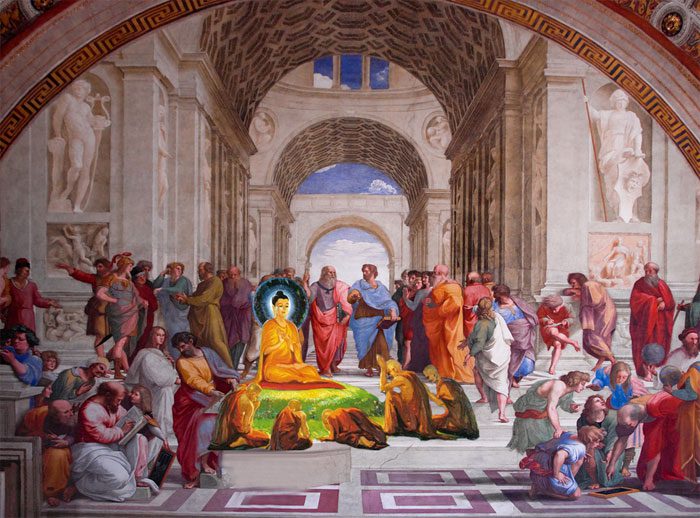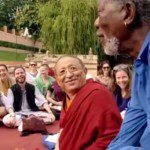Last Wednesday, Jay Garfield (who I wrote about in 2013) and Bryan Van Norden published an op-ed in the NYTimes calling for the renaming of university “Philosophy” departments to something like “Western or Anglo-American philosophy departments” so long as they refuse or fail to incorporate philosophy from outside of the Western world (or even a particularly circumscribed section of the Western world). They write:
Given the importance of non-European traditions in both the history of world philosophy and in the contemporary world, and given the increasing numbers of students in our colleges and universities from non-European backgrounds, this is astonishing. No other humanities discipline demonstrates this systematic neglect of most of the civilizations in its domain. The present situation is hard to justify morally, politically, epistemically or as good educational and research training practice.
As a graduate from a wonderful philosophy department (University of Montana), I am sympathetic to departments’ desires to “stay with the canon” of accepted Western philosophy. Thinkers such as Plato, Aristotle, and Kant have staying power because people continue to find new wisdom in their works, works that reveal not only singular genius but also sensitivity to and clarity about the world around them. And Western philosophers have given rise to and helped shape modern science (once known simply as “natural philosophy”), psychology, and politics, among other things.
However, their oversights cannot be ignored, and the world we live in today has changed (mostly for the better). Two of my most powerful philosophy courses explored environmental and feminist concerns respectively, in large part because these were issues most clearly of importance to me as an embodied subject living in 21st century America. A third incredibly powerful course was one taught in an environmental studies department by a queer-theory and ethics scholar on the topic of religion (“Greening of Religions” by Dan Spencer).
One change in this new era of globalization has been a growing awareness of ideas coming from the East. As Garfield and Van Norden note, this has happened before and “philosophy has always become richer as it becomes increasingly diverse and pluralistic.”
I know my own education benefited enormously from the diversity and pluralism it incorporated; and one of the most shocking realizations I had at a conference on Higher Ed at Naropa University in March was just how rare this kind of education is becoming. I also took courses on Buddhist Ethics and Buddhist Psychology (though they were listed only as Religious Studies courses), which opened my eyes to the brilliant and complex ways that Buddhism has, as a tradition, encountered philosophical problems from its very beginnings.
So why is Buddhism (along with much other worthy fields of thought) excluded from our Philosophy departments?
- Overly utilitarian thinking: “we only have time to cover so much territory, we must focus on the best…” This, ironically, is the same argument Business Schools are giving for demanding that their students gain exemption from required philosophy courses. If we want the “best” business or science students, can we risk them spending precious hours pouring over and debating Aristotle or Spinoza? The current intellectual crisis in higher ed along these lines is discussed here.
- Poor understanding of the categories of philosophy and religion: too many times I’ve heard smart people assert “Buddhism just is a religion…” against assertions by Buddhists, philosophers, and others that Buddhism may have other identities. My answer to this has long been “Yes and…“. Barbara O’Brien has a thoughtful essay on the topic as well. My article with Doug Smith: “Reading the Buddha as a Philosopher” (just published in Philosophy East and West) addresses this topic and I plan to write more about this in coming weeks.
- Ignorance about the topic: “we don’t understand Buddhist philosophy, therefore we can’t teach it.” The same could have been (and surely was) said of feminist and environmental philosophy before they made their way into departments across the country. And having met and spoken with the brilliant ecofeminist teacher Karen Warren, I know we face an uphill battle here.
As Amy Olberding explains in a comment over at DailyNous, these are just a few of the ways that non-Western philosophy will be dismissed. As she astutely notes, “What you won’t find in any of these conversations: reasonable intellectual humility, anything like the inveterate curiosity philosophy purportedly cultivates, or responsiveness to epistemic authority and expertise.
Yet with just the smallest bit of intellectual curiosity and humility, one will see that the great thinkers of Buddhist history dating back to the Buddha himself, and including Nāgārjuna, Vasubhandu, Buddhaghosa, Śāntideva, Tsongkhapa, and others can appear before us as brilliantly systematic and consistent moral thinkers. As Richard Gombrich writes of the Buddha:
On the one hand, I do not think the Buddha was interested in presenting a philosophically coherent doctrine: the evidence that his concern was pragmatic, to guide his audience’s actions, is overwhelming. On the other hand, I have also concluded that the evidence that he had evolved such a structure of thought and that it underpinned his pragmatic advice is no less compelling. (What the Buddha Thought, p.164)
Charles Goodman, in skillfully introducing a breadth of Buddhist thought to Western philosophers, asks that we:
Suppose the great thinkers of the Buddhist tradition, such as the historical Buddha himself, or Buddhaghosa, or Asanga, or Śāntideva, were somehow to learn about and come to understand the debates in Western philosophy about free will, ethical theory, justice, virtue, the demands of morality or the justifications of punishment. How would they respond to these debates? (Consequences of Compassion, p.4)
Not only that, but what debates were *they* having that might have interested Western thinkers such as Plato, Augustine, Aquinas, Descartes, Hume, and Kant… As the flow of great thinkers moves from East to West, a flow of ideas to be discussed should follow. As Jin Park writes:
In an essay that is now a classic piece in understanding postmodern culture, Jean-François Lyotard wrote: “Eclecticism is the degree zero of contemporary general culture: one listens to reggae, watches a western, eats McDonald’s food for lunch and local cuisine for dinner, wears Paris perfume in Tokyo and ‘retro’ clothes in Hong Kong.”* The boundaries have become blurred in both positive and negative senses. Geographical borders are becoming loosened by virtue of easy communication via cyberspace and the emergence of communities such as the European Union, cultural boundaries are being blurred through international capitalism, and temporal boundaries of the past are being violated through the increases in our knowledge and imagination. Almost a quarter century after Lyotard described the present era as the time of eclecticism, the world has become more global, and the demand for cross-, inter-, and multi-cultural knowledge has become stronger than ever. (Comparative Political Theory and Cross-Cultural Philosophy, p.1)
And for many in the West today, Buddhist-derived ideas and practices (Mindfulness, anyone?) are as much a part of the daily eclecticism as anything else. Park concludes her introduction to the volume with words from Maurice Merleau-Ponty: “Western philosophy can learn from [India and China] to rediscover the relationship to being and the initial option which gave it birth, and to estimate the possibilities we have shut our selves off from in becoming ‘Westerners,’ and perhaps reopen them.” (p.13)**

Other responses (compiled by Justin W at DailyNous):
- The “All Lives Matter” response— “Huge stretches of European philosophy… are also neglected in many of the top 50 PhD programs”—at Leiter Reports.
- The “Don’t Be Presumptuous” response— “One complicating factor the authors do not address however is that in many cases there has been a long and contentious history surrounding the question whether the category of ‘philosophy’ is one that representatives of non-European intellectual traditions would even want, or would have wanted, to adopt as a description of what they are doing” — at the blog of Justin E.H. Smith.
- The “Be More Radical” response—“Diversity talk only gets us so far. The gaze needs to stop being so neutral. It needs to be deeply critical and decolonizing”—at the blog of John E. Drabinski.
- The “Red Herring” response—“While there is, indeed, a fairly narrow historical canon in professional philosophy, this canon is not central to philosophical education, philosophical method, and professional advancement/success within analytical philosophy”—at Digressions & Impressions.
- The “Up Periscope” response—“Far too many philosophers… are… scared of the cooties they’d pick up by actually knowing the first thing about the history of almost all the other humanities disciplines”—at John Protevi’s Blog.
- The “Pardon Me, Gentlemen” response—“Even as the arguments are made that ‘Western’ is an inadequate descriptor of ‘philosophy’ in the U.S…. mentions of that same tradition’s constitutive patriarchy and heteronormativity are more or less relegated to ‘et al’ status” at ReadMoreWriteMoreThinkMoreBeMore.
ALSO - Supportive comments via the Indian Philosophy Blog.
- I look forward to two posts coming out soon (one next Sunday, and one two weeks from them) from Amod Lele at Love of All Wisdom.
* Jean-François Lyotard, “What is postmodernism?” in The Postmodern Condition: A Report on Knowledge (Minneapolis: University of Minnesota Press, 1989), p. 76.
** Speaking of Merleau-Ponty, if you haven’t read it yet, see my review of the excellent The Way of Tenderness: Awakening Through Race, Sexuality and Gender.












